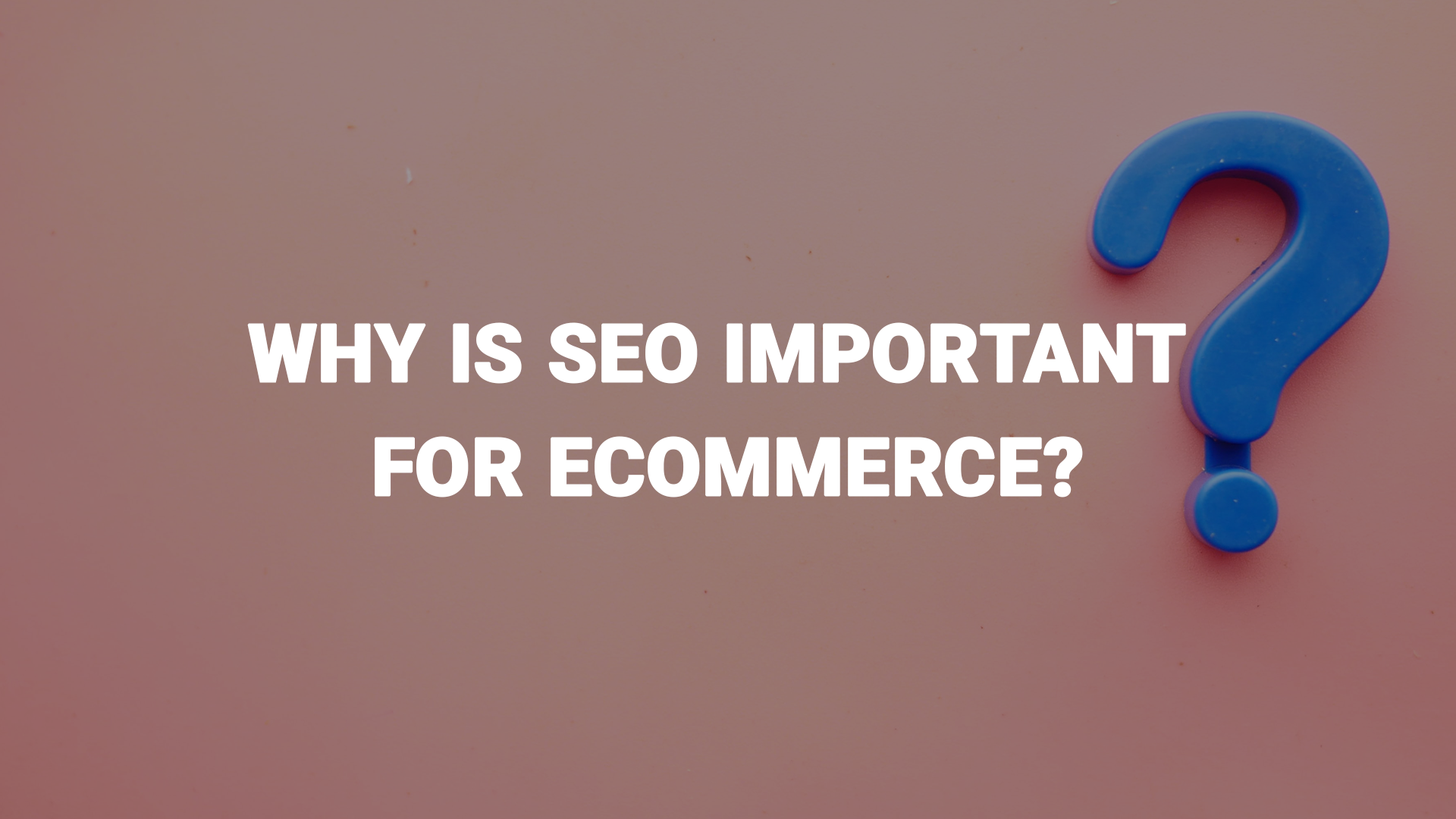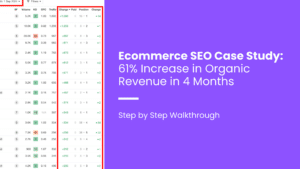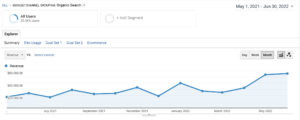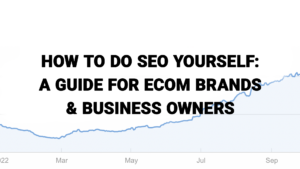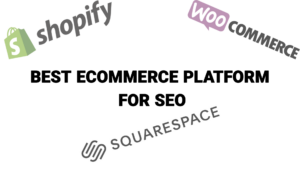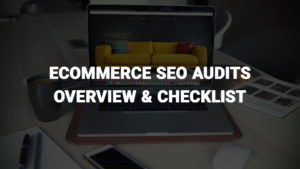If you own an ecommerce website or brand, SEO, or Search Engine Optimization, is a phrase you’ve probably heard or read about at least a few times. If not, you’re missing out on one of the most powerful marketing channels available to websites today. Before we dig into why SEO is important for ecommerce, let’s do a quick review of what SEO is to begin with!
What is SEO?
SEO is the practice of optimizing a website to help it show up on Google searches and other search engines. In general, the process involves creating website content, addressing on-page and technical SEO issues affecting your website, and building backlinks to help give your website more authority. The end goal is to have your website show up in the right search results to earn more traffic and sales.
While it sounds simple on paper, the above requires a honed in strategy that aligns all phases of the SEO process to see an increase in website traffic and sales. More importantly, an improperly executed SEO strategy can actually hurt your website or make it nearly impossible for customers to find your website. Brands are often encouraged to bring on an SEO consultant or strategist to help guide them through the process.
It’s also important to understand that SEO is not a “flip-the-switch” marketing channel. It requires consistent investment and activity, month-after-month, and the level of effort required to compete will depend on how competitive your niche is.
Organic Search vs Paid Search
It’s also important to understand the difference between organic search results and paid search results or ads. When you see search engine results on Google, an untrained eye might only see that there are a handful of website links. But to the trained eye you’ll notice that there are actually a mix of ads and organic searches.
While it can be advantageous to show up for both organic search results and have paid ads running, a majority of search engine users wind up clicking on the organic results instead of the paid ones.
Why is SEO important?
Where do we start? First off, if your website is setup incorrectly, Google and other search engines will not be able to crawl your website, let alone have your website pages show up on Google. You’ve probably heard the phrase, “if a tree falls in the forest, does it make a sound?” The same applies for SEO. You can build a website, but if it can’t be crawled or indexed on search engines, it might as well not exist.
In addition to that, SEO makes it possible for customers to find your website when they search for your brand and also possible for new customers to find you through various keyword searches.
When used correctly SEO for ecommerce sites can be a powerful marketing channel that not only grows the business, but also helps feed and support other marketing channels, such as email marketing, PPC advertising, and social media marketing.
How can SEO Help Ecommerce Businesses?
While SEO can be beneficial to any website or business, it also has specific benefits for ecommerce sites.
Target Customers at Different Stages of your Funnel
When potential customers are researching a new product they tend to have specific questions related to which stage of the sales funnel or buyer’s journey they are at.
Targeting Top of the Funnel Content
At the top of the funnel or buyer’s journey you people might search for more informative topics on Google. They’ll ask questions to learn more about the type of product they are shopping for so they can make a more informed decision when they are ready to buy.
In some cases, those at the top of the funnel might not even know what product they need, they might only know what problem they have and are looking for a solution. Finding long tail keywords to target with your content can be a great strategy for finding and addressing the questions your customers have at this stage of the funnel.
Addressing the Middle of the Funnel
Once potential customers have done some research, they’ll usually start to investigate which brands are the best, which products have the best reviews, and which features from their previous research will meet their exact needs and budget. The questions and searches they make at this stage will have more of a comparison feel and be drastically different than the informative stage.
Turning Searchers Into Customers
Finally, we have the buyer stage. When potential customers are ready to buy, they are sometimes found typing “where to buy ________” directly into Google. Showing up for these keywords can bring in a ton of business as you’re showing up in front of ready to buy customers.
No matter what stage of the funnel you’re targeting with your SEO approach, the key concept you need to focus on is search intent – meaning – what did the person who searched for a specific keyword exepct to find when they typed the phrase into Google.
The more you align your website with the intent of the searcher, the better your results will be.
Feed New Customers into your Other Marketing Channels
While SEO traffic can convert at a very high rate, it’s probably not a surprise to read that many people need multiple touchpoints with a brand before deciding to make a purchase.
The great thing about SEO is, you can attract so many new people to your brand, some that are ready to buy, but others who might only be ready to sign up for your email list, or need to be retargeted with a PPC campaign, or need to fall in love with your brand some more after seeing some of your social media content.
No matter the scenario, SEO can be introduction to your entire marketing ecosystem, and be a great way to supply your brand with new customers month after month after month.
Understand What Keywords Your Competitors Are & Aren’t Targeting
Using various SEO tools, you can also understand which keywords your competitors are ranking for and what they aren’t ranking for.
Putting together a strategy to target the keywords your competitors are already ranking for can help you steal traffic and customers away from them and introduce them to your brand.
On the flip side, there may be content topics, questions, and searches your potential customers also search for that your competitors haven’t addressed yet on their website, providing you with some easy opportunities if you do the keyword research to identify those gaps.
Launch New Products into the Market
Have a new product you’re launching? It’s essential that your product is easily found online and one of the best ways to make sure that happens is to optimize that product correctly. Incorporating SEO into your product launch strategy will make it easier for people to directly find your product or to discover your product in related keyword searches.
Advantages Over Other Marketing Channels
While all marketing channels have their pros and cons, SEO has some particular advantages over PPC advertising, email marketing, and social media marketing.
SEO Advantages Over PPC Advertising
With PPC advertising, you have to pay-per-click, meaning that if you want more traffic, you have to increase your ad budget. This strategy corners you into only being able to scale by spending more money.
In addition to needing to pay-per-click, PPC advertising also makes you subject to ad platform changes, most notoriously the iOS update that affected the ability for advertising to target iPhone users on the Facebook marketing platform.
SEO can also help inform PPC keyword research by using tools like Google Search Console to uncover hyper-specific keywords to target.
SEO Advantages Over Email Marketing
Email marketing is a fantastic marketing channel as it allows you to stay in front of your customers and allows you to leverage customer data that you own. The disadvantage it has to SEO is that you need to send traffic to your website to get people onto your email list. Unlike SEO, email marketing is not an independent marketing channel and relies on you capturing cusotmer’s email addresses via another channel first.
SEO Advantages Over Social Media
Social media can be a great way to connect wit your customers emotionally, but it requires a level of content creation that is often unrealistic or unsustainable for many ecommerce brands, especially when they are first launching. In many cases, you’ll have to be creating multiple pieces of content every day, and for multiple platforms. While this effort can be worthwhile if your brand goes viral or you build a large audience, SEO requies a significantly smaller investment for brands to find and scale success.
Making your Brand Presence a Digital Asset with SEO
The overall goal of SEO, outside of getting more sales, is to make your website a true digital asset. If you’re ranking for relevant keywords, creating helpful content for your prospective customers, and growing your overall brand presence and authority, your website can leverage your SEO efforts to become more stable and primed for growth.
Ecommerce SEO Services
In need of Ecommerce SEO Services? Feel free to compare Baltimore SEO Companies or contact our team today at Noah Kain Consulting. If we’re a good fit to work together, we craft personalized SEO strategies to help scale traffic and sales for ecommerce websites.
